Election results 2017: A night to manage expectations
- Published
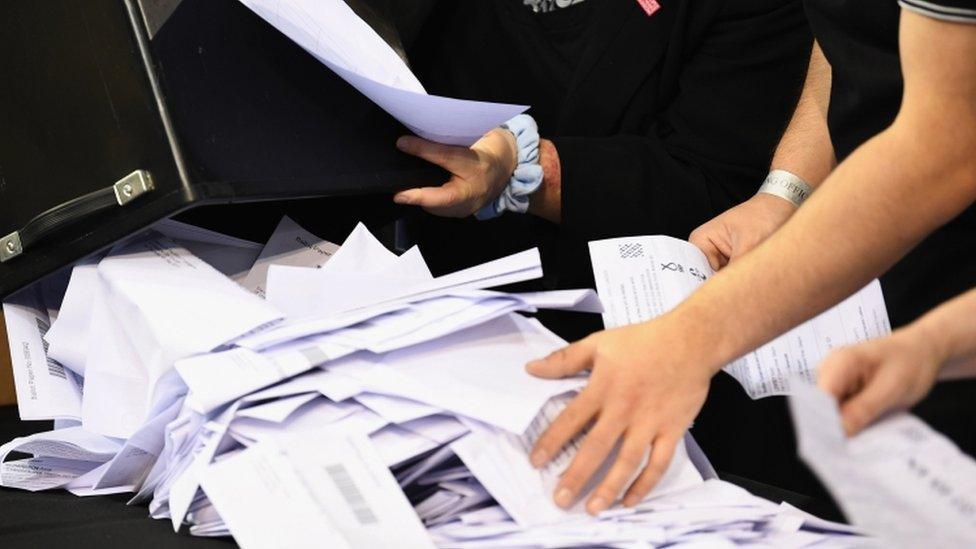
The votes have been cast and counting is under way, and exit polls suggest another turbulent night in Scottish politics. But some parties might prove easier to please than others.
The exit poll. which suggests the SNP could lose 22 seats, has done some weird things to expectation management.
It's a key task in electoral politics. Overegg your prospects and you risk not living up to them; underplay them and you might struggle to get your voters to turn out.
So if you find yourself a bit baffled in the wee hours when a party with three seats look happier than one with 30, it's because they went into tonight with totally different expectations.
It's well established that the party that wins the most seats wins the election. But be prepared for all kinds of spin from the parties in second, third and fourth place.

SNP - How do you top 56 in 2015?
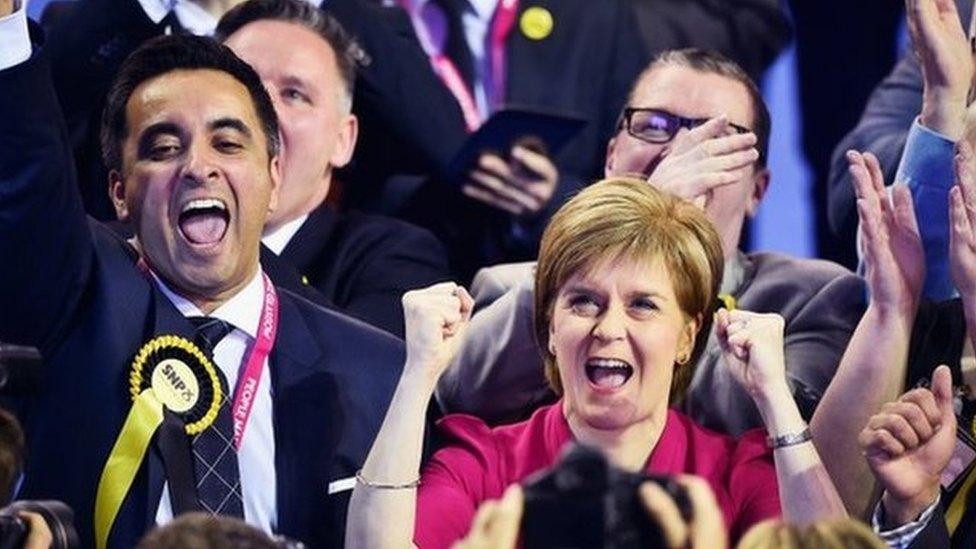
That was 2015 - will Nicola Sturgeon be leading the celebrations again in 2017?
Remember that the exit poll, despite those projected SNP losses, still has them winning a majority of Scottish seats.
Throughout, even the most pessimistic projections have had the SNP ahead of their rivals by a country mile.
But then, everybody knew that. Holding almost every seat, they had the most pressure on them from the off.
The SNP are the big kid in the playground nowadays; they're expected to win every scrap they happen to get into.
Really, the SNP's toughest opponent in the 2017 election is the SNP in the 2015 election. Winning 56 out of 59 seats is a personal best score that would be very tough to beat.
They're racing against the ghost car in Mario Kart, having left the other parties in the dust in the overall contest.
To put it another way, Nicola Sturgeon went into this election facing the issue that Celtic manager Brendan Rodgers will face in domestic football next season. How do you top winning all of the trophies without losing a game?
But still, they appear on track to win the league. Anything more than 30 seats, and Nicola Sturgeon will declare victory.
And if there is a hung parliament, she could end up playing a rather significant role indeed...
Scottish Conservatives - Building on low base
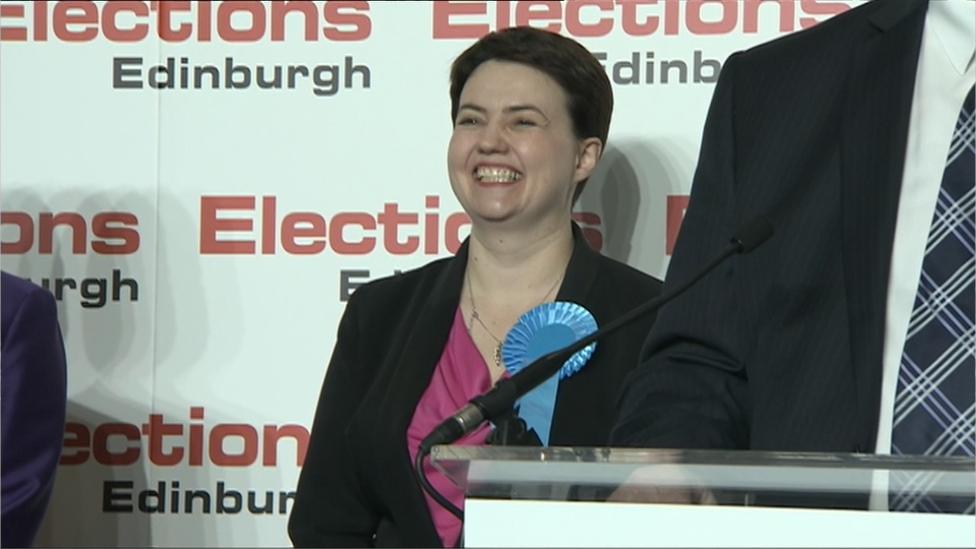
Will Ruth Davidson be smiling at the end of the night?
Expectation levels were different for the Tories. They expected to romp home across the UK as a whole - that's why the election was called, after all. But north of the border they had their eye on maybe a dozen seats at best - marginal seats in the borders, and some more ambitious picks in the North East.
Conversely to the SNP, they started from a very low base - one seat. A single gain would double their return, and they were very confident of at least doing that.
They also created a bit of expectation for themselves by talking up tough contests like Moray and Perth and North Perthshire, where the SNP have long-standing incumbents defending healthy majorities.
The exit poll suggests they were not wrong to do so.
But it could be a bittersweet night for the Tories - they might end up celebrating big gains north of the border, but a big disappointment UK-wide.
Either way, expect Ruth Davidson to make lots of hay with SNP setbacks, as much as with Tory gains.
Labour - Coming back in heartlands
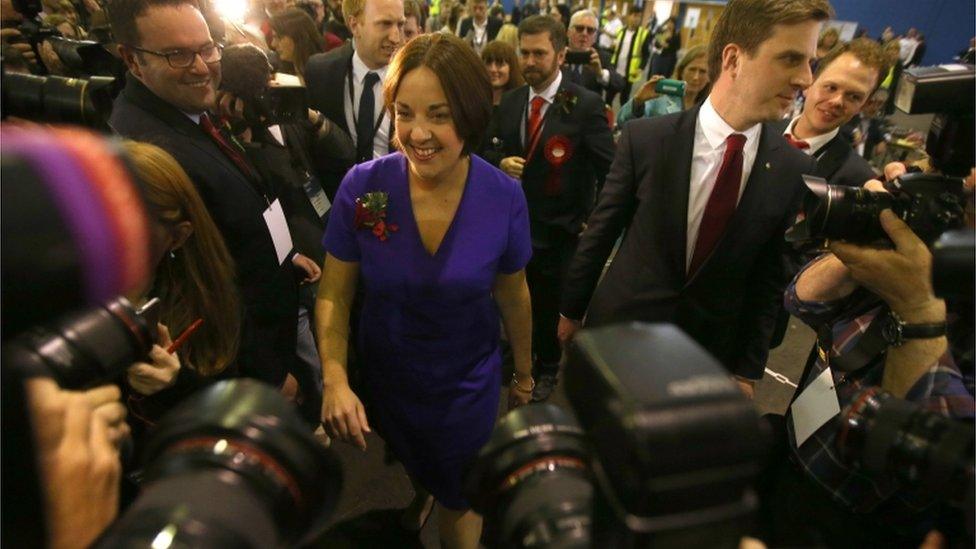
It's increasingly hard to find a picture of a Scottish Labour politician smiling at an election count
After a succession of electoral batterings, expectation levels for Labour were arguably the lowest of the four main parties.
In 2015 they lost 40 seats. Things couldn't possibly be that bad again - they don't have 40 seats to lose. All they need to do is hold one seat, and they've managed to hold steady.
The party now says it's confident of gaining seats in Scotland. It would have seemed profoundly odd prior to 2014, but that has been life for Scottish Labour since the independence referendum. When you're flat on your back, the only way you can look is up.
Having taken such a pasting last time really made Labour's job easier; they targeted a big chunk of their election resources to defending Edinburgh South, and could pick and choose potential targets like East Lothian.
The risk for Labour was in falling into fourth place behind the Lib Dems, who had their eye on some slimmer marginals. It now appears they will get a run for their money.
Scottish Liberal Democrats - Second place hopes
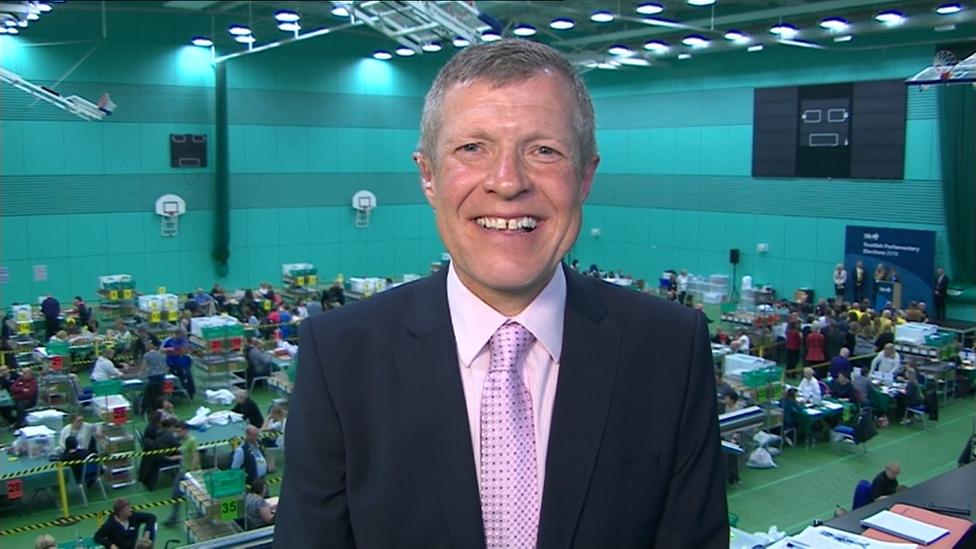
Willie Rennie's Lib Dems hope to inspire a similar grin with their general election haul
The Lib Dems are also defending one seat (a theme emerges), so are starting from a low base. They've also targeted their resources into key target seats - and actually had a better starting point than most.
Looking at the 10 most marginal seats of 2015, the Lib Dems were in second place in four of them. That's more than the SNP (three), Labour (two) or the Tories (one).
They hope they can take back some of their traditional heartlands which were nabbed by the SNP in their 2015 tsunami, and will probably be disappointed if they don't at least add one or two. In terms of initial expectations, place them somewhere in between the Tories and Labour.
The exit poll looks good for them - but again they're injecting some caution into their optimism.
This election featured fewer candidates than any other poll in recent history. The big four mentioned above are the only parties contesting the majority of seats.
The also-rans
So for UKIP Scotland and the Scottish Greens, standing in ten and three seats respectively, expectation levels are precisely nil. Any kind of victory for them would be unprecedented, and they would celebrate as such.
To go back to the football metaphors, it would be like how San Marino celebrate madly about managing a goalless draw, while England sack their manager for only making it to the quarter finals (again).